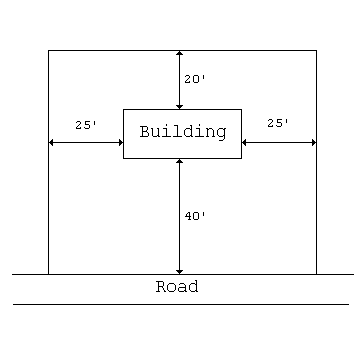|
(1) German mathematician Johannes Regiomontanus
(1436 –1 476) posed the following question:
From what position along a horizontal line can
a statue best be viewed? If the spectator is
too close, the statue will appear heavily
foreshortened, thus distorting its size. If
the spectator is too far away, it will simply
be too small to see. An optimal distance for
viewing the statue must exist.
For example, the height of the Statue of Liberty is
305 feet from the ground to the tip of the torch.
If you are on a boat in the harbor and the deck is
10 feet below base of the statue, how far away
should you be to view the statue at its optimal
angle? What is the optimal angle?
Answers: 56.12 feet, angle is 69.79 degrees
(2) Given an isosceles triangle with equal sides of 3
inches in length. Determine the measure of the
angle between the two equal sides which results in
the largest area.
Answer: 90 degrees
(3) Construct a window in the shape of a semi-circle
over a rectangle (like many stained glass windows in
churches). If the distance around the outside of
the window is 12 feet, what dimensions will result
in the rectangle having the largest possible area?
Answers: The rectangle's dimensions would be 2.33
feet by 3 feet, so the area would be 6.99 square
feet.
(4) Ladder in the hall Problem
A non-folding ladder is to be taken around a corner
where 2 hallways intersect at right angles. One
hall is 7' wide and the other hall is 5' wide. What
is the maximum length that the ladder can be so it
will pass around the corner?
Answer: 16.89 feet
(5) During the Winter break, Matt E. Matics is enroute
to his sister's house. Two policemen are stationed
two miles apart along the road, which has a posted
speed limit of 55 mph. The first clocks him at 50
mph as he passes, and the second policeman clocks
him at 55 mph, but pulls him over anyway. When he
asks why he got pulled over, the policeman responds,
"It took you 90 seconds to travel 2 miles." Why is
he guilty of speeding according to the Mean Value
Theorem?
Answer: His average rate is 80 mph. There must have
been at least one point over the interval where the
instantaneous rate of change (velocity) must equal
the average rate of change (average speed).
Therefore, old lead foot Matt must have traveled 80
mph at least once, and the policeman can ticket him.
(6) The practice of shooting bullets into the air – for
whatever purpose – is extremely dangerous. Assuming
that a hunting rifle discharges a bullet with an
initial velocity of 3000 ft/sec from a height of 6
feet, answer the following questions:
(A) How high will the bullet travel at its peak?
(B) At what speed will the bullet be traveling when
it slams into the ground, assuming that it hits
nothing in its path?
Answers: (A) 140,631 feet (it takes 93.75 seconds to
reach the maximum height)
(B) 3000.064 ft/sec
(7) To celebrate our 40th Anniversary in 2008, I am
commissioning the construction of a four-inch tall
box made of precious metals to give to my wife.
The jewelry box will have rectangular sides and an
open top. The longer sides of the box will be made
of gold, at a cost of $300 per square inch; the
shorter sides will be made of platinum, at a cost
of $550 per square inch. The bottom will be made
of plywood, at a cost of 2 cents per square inch.
What dimensions provide me with the lowest cost if
I am adamant that the box have a volume of 50 cubic
inches?
Answer: C = 2400x + 4400y + xy(.02)
Dimensions are 4.787 in x 2.611 in x 4 in.
(The lowest cost for the box will be
$23,000 – do I still need to buy a card?)
(8) A builder is purchasing a rectangular plot of land
with frontage on a road for the purpose of
constructing a rectangular warehouse. Its floor
area must be 300,000 square feet. Local building
codes require that the building be set back 40 feet
from the road and that there be empty buffer strips
of land 25 feet wide on the sides and 20 feet in the
back. Find the overall dimensions of the parcel of
land and building which will minimize the area of
the land parcel that the builder must buy.

Answer: Dimensions of the building: 500' x 600'
Dimensions of the land: 550' x 660'
|
